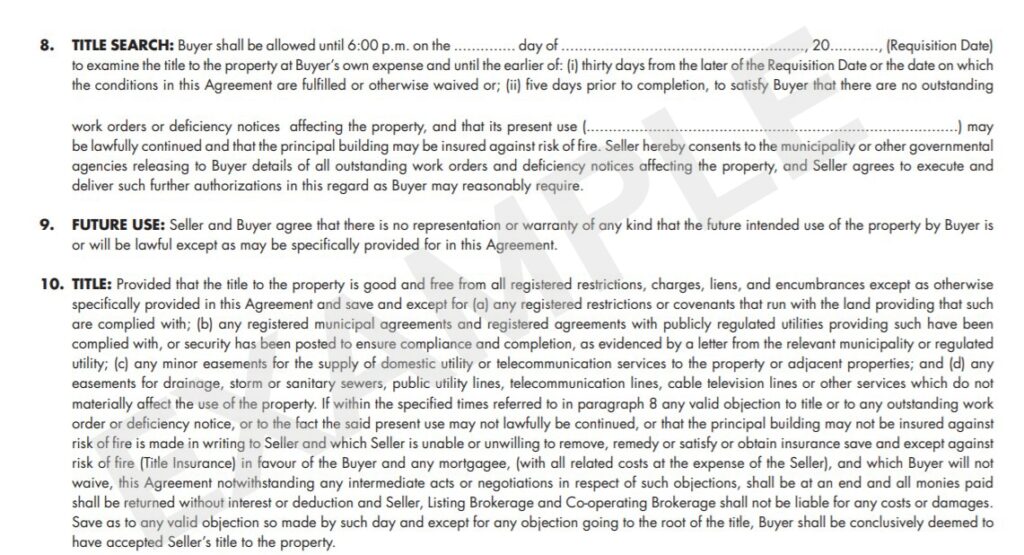If you’re looking to buy a home in Toronto, you’ll quickly become familiar with the standard-form Agreement of Purchase and Sale by OREA. Many Real Estate practitioners across the province use this agreement. It contains 27 standard-form worded clauses. However, if you were to ask a dozen Sales Representatives, few would likely understand the Requisition Date.
The Requisition Date is an incredibly significant date. Take due care when selecting it. A Sales Representative or Broker who knows not of the gravity of such date is a liability to all involved in the transaction.
This unfortunate lack of knowledge and understanding of the date, combined with some REALTORS® general lack of due care, can lead to calamity in a Real Estate Transaction, as illustrated by several court cases.
On This Page
What is The Requisition Date?
The Requisition Date is a date by which the Purchaser of Real Property in Ontario should have completed necessary Title and Off-Title Searches and be aware of all problems relating to Title of the subject property.
These issues include problems related to:
- Lawful continuance of present use or compliance with Zoning By Laws
- Success in obtaining fire insurance (via existence of a retrofit certificate, if necessary)
- Compliance with The Planning Act, where necessary.
- Easements, Encroachment Agreements, or other minor issues affecting title
- Outstanding work orders or deficiency notices against the property.
- Possession or occupancy of the property after closing (See: Vacant Possession)
It’s important to note that the Requisition Date itself is not the deadline for objecting to title issues. Rather, it is used in the calculation for such deadline.

Sound confusing? That’s because it is. The deadline for the objection of title is a confusing calculation.
Calculate the Requisition Date
Here’s how the calculation section of the Requisition Date in the “Title Search” clause reads:
“Buyer Shall be allowed until 6:00 pm on [DATE] (Requisition Date) to examine the title to the property at Buyers own expense and until the earlier of (i) thirty days from the latter of the requisition date or the date on which the conditions of this agreement are fulfilled or otherwise waived or ; (ii) five days prior to completion, to satisfy Buyer that…”
The method to calculate the Deadline to Object to Title Issues on the property is as follows:
1. Determine the Latter date between the (A) Requisition Date and (B) Date on which the last condition (if any) in the agreement is waived or fulfilled.2. Calculate thirty days following (A) or (B). Remember this date.3. Calculate 5 days prior to the “Completion Date” specified in the agreement.
The Earlier of (2) or (3) is the deadline to object.
Although the Requisition Date might not be used in determination of the deadline, it is an indicator of when a Lawyer should have completed the necessary searches.
How does The Requisition Date Affect the Agreement?
The calculated “Objection Date” affects both purchasers and sellers in an Agreement. Clause 10 (“Title”) provides that if such objections are made prior to the Objection Date and the Seller is either unwilling or unable to remedy the issues therein, (either by fixing the issues or obtaining Title Insurance), the agreement could be considered at an end and the deposit monies returned to the respective parties.
If the purchaser does not object to title by the Objection Date, then the purchaser has accepted title to the property.
“On Title” Versus “Off-Title” Issues
The clause in the agreement provides for objection to issues that may be more than “registered on Title”. It’s important to note that Title Issues on a property can exist in valid form even if not explicitly “on Title”.
Examples of valid off-title objections include:
- Tax Arrears
- Work Orders
- Deficiencies voiding fire insurance
For this, a lawyer may choose to perform Off-Title, or Non-Title Searches.
Some ways a Lawyer should properly perform off-title searches include:
- A letter to a City or Town’s Building Department, requesting confirmation no work orders affecting the subject property exist.
- A request for the City or Town to provide a Tax Certificate, showing any arrears (which could take Title Priority) for the subject property.
Running to The Root of Title
The “Title” clause in the Agreement of Purchase and sale provides for issues that run to the Root of Title.
In Ontario, the primary objective for a Lawyer acting for a Purchaser in an exchange of Real Property is to obtain good and valid title on behalf of their client. Lawyers, as well as Realtors®, should advise their clients of any issues that would affect title to the subject property and proceed according to clients directives.
It’s important to make a distinction between Title Issues, and issues that run to the Root of Title.A Title issue is something that could affect the “marketability” of interest in a property. These issues might not injure the owner of Title directly, but could have implications. For Example, tax arrears on a property wouldn’t cloud title (in normal circumstances). The owner with the beneficial interest in land hasn’t lost title to their property or their priority in the claim of beneficial interest in land.
Similarly, an outstanding Work Order could affect the marketability of the property (i.e. the property isn’t legal until the Work Order is Complied with), but doesn’t really have an effect on the ability to transfer title from one owner to another. (Exceptions, as always, may apply). The Market Value of the property might be reduced due to these issues, but no prohibition on the transfer of title exists in these situations.
Title-Related Issues
By contrast, An issue that runs to the Root of Title, is a claim or encumbrance that prohibits a purchaser from obtaining good and valid Title. For example, a mortgage would have to be discharged in order for the property (as specified in the agreement) to be conveyed to a purchaser. If the Purchaser accepted Title without ensuring this encumbrance is cleared, it would be essentially the same as purchasing the property LESS the value of the Charge/Mortgage.
Issues that run to the root of title can be objected to right up until the date of closing.
It’s important to act in good faith when objecting to issues. Lawyers, Purchasers, and Sellers, should always be acting with the common interest and goal of successfully conveying subject property from the Seller to the Buyer. Cooperation, collaboration, and reasonable accommodation is expected by both parties.
Various cases exist related to Title objections, where one party attempted to hide, construe, or otherwise manipulate facts pertaining to title to gain competitive advantage in the sale. The courts do not look favourably upon this type of behaviour. Read about an interesting case here.
Preprinted Versus Typed
Working in Real Estate, I’ve seen some interesting clauses proposed by agents in Agreements. Recently, I received an offer on a property with a clause similar to the following:“Seller Agrees to rectify and remove any work orders at their expense.”
As a REALTOR®, I have many issues with this clause. However, the biggest issue is that it essentially supersedes the Title Search and Requisition process, and applies a blanket covenant by the Seller.
The OREA Agreement of Purchase and Sale stipulates that typed clauses supersede their preprinted counterparts. It’s important when reviewing an agreement to not inadvertently waive a right provisioned for in preprinted Agreement wording.
Missing the Deadline Date
The Requisition Date should be of utmost importance to Purchasers in an Agreement of Purchase and Sale; second only to condition deadline dates.While missing the Requisition Date (or associated deadline) can have consequences in conveying Real Property, it isn’t the end of the world.As a reminder, if the issue runs to the Root of Title, concessions must be made or the agreement could be viewed at an end.Problems that do not to the root of title but are discovered outside of the deadline can be mediated with options such as Title Insurance.
The Requisition Date is an incredibly important date in the Agreement of Purchase and Sale. Due care should be taken by Purchasers, REALTORS®, and Lawyers when selecting, negotiating, and operating in accordance with such dates.
Wish to work with someone who knows all about Requisition Dates? Have additional Questions? Contact Us or ask Baron to represent you in your next transaction.

